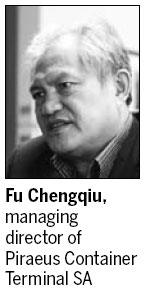COSCO eyeing further Piraeus port investment
Updated: 2012-06-19 07:49
By Fu Jing in Athens (China Daily)
|
|||||||||||
Chinese shipping giant COSCO Group has been running the rule over further investment in Greece, after making what it is calling a "record-breaking" success of operating parts of the struggling Piraeus Port outside the country's capital Athens, despite the unfolding European debt crisis.
According to Fu Chengqiu, managing director of Piraeus Container Terminal SA, COSCO is now in the middle of an in-depth feasibility study of becoming involved in various privatizations planned by the Greek government in coming months.
"We are waiting for the formation of a new government to make further decisions," he told China Daily.

After running various parts of Greece's largest port for the past two years, Fu said that the Greek authorities have already expressed their interest in further investment by COSCO, and by other Chinese companies, in their plans to privatize a variety of state-owned assets, believed to be worth around 50 billion euros ($63 billion).
Many of the country's top business figures have also suggested that COSCO's success could be just the beginning of future Chinese-Greek economic and business cooperation, he added.
Fu said COSCO had shown interest in building a logistics center, for instance, at an estimated cost of 280 million euros, being planned 30 kilometers from Piraeus. But the project finally failed to attract Fu's company due to various reasons.
Another project attracting interest from officials is the privatization of Piraeus Port Authority, which would give it further opportunities to become involved in cruise liner operations, ship maintenance, coastal real estate, port management, and Piraeus's No 1 pier.
COSCO has operated Piraeus's No 2 pier since June 2010 and built its No 3 pier. It signed a 35-year lease and pays 100 million euros to the Greek government every year for its presence at the port.
According to Fu, COSCO officials have already instructed him to carry out a feasibility study into financing various projects believed to be worth around 300 million euros, and 200 million euros of debt.
Apart from further investment, Fu said his company has also been working on various financial plans in the event of the worst-case scenario of Greece exiting the eurozone.
"We have completed several packages of solutions, which are prepared for the worst situation," said Fu, who couldn't provide any further details.
Business figures from COSCO's running of Piraeus make impressive reading.
"We have not only survived but also broken historic records in handling containers," said Fu.
Before COSCO's involvement, Piraeus's handling peaked at 1.5 million TEUs, the shipping industry standard measurement of 20-foot containers units, in 2006 but the financial and debt crisis dragged that down to 450,000 TEUs in 2009.
From the following June, when COSCO started operating in Piraeus, it handled 680,000 TEUs for the seven months to the end of 2010.
At No 1 pier, which is still owned and run by the Greek authorities, 220,000 TEUs were recorded during the seven months.
In 2011, COSCO's No 2 pier handled 1.18 million TEUs and the Greek's No 1 pier 500,000 TEUs.
"In total, last year we broke the records set in 2006," said Fu.
During the first five months of this year, Fu said his pier has already handled 870,000 TEUs, and in total, Piraeus Port is expected to handle 2.1 million TEUs.
"Though the crisis and uncertainties are still unfolding, we think this is a realistic target for us," said Fu.
Despite Greece still being in deep crisis, Fu added that he still considers Piraeus as a vital gateway for shipping heading to Europe.
"The port's geographic advantages, and the quality services offered by us, have helped deliver rapid progress, in a crisis era," he said.
He added that his goal is to boost Piraeus's annual capacity to 3.7 million TEUs and transform the port into the leading Mediterranean and even European transshipment hub.
COSCO is busy transforming No 3 pier into a deep-sea port, which will be able to host the world's largest cargo vessels with a maximum capacity of 18,000 TEUs, and Fu said its success at the port has won the hearts of Greek government and the local workforce.
With that now established, and still growing reputation, he said COSCO is in pole position to participate in any planned privatization of Greece's top 22 state-owned enterprises.
Today's Top News
President Xi confident in recovery from quake
H7N9 update: 104 cases, 21 deaths
Telecom workers restore links
Coal mine blast kills 18 in Jilin
Intl scholarship puts China on the map
More bird flu patients discharged
Gold loses sheen, but still a safe bet
US 'turns blind eye to human rights'
Hot Topics
Lunar probe , China growth forecasts, Emission rules get tougher, China seen through 'colored lens', International board,
Editor's Picks

|

|

|

|

|

|





